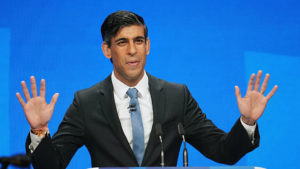Penny Mordaunt is the only candidate in this leadership election whose formative political experience was war. She claimed this week that she knew she was a conservative as soon as she watched Margaret Thatcher’s naval task force sail from Portsmouth Harbour as the Falklands War began in 1982. The ships, the uniforms, the flags. Mordaunt saw the pomp and the guns, and her thoughts turned to Westminster. She was distant enough from the blood and the smoke to be made optimistic by the conflict.
This buttery patriotism is one part of Mordaunt’s political make-up. There is also a Cameroonian social liberalism, pro-immigration, and pro-LGBT rights; she is a Brexiteer. Her breezy-sunny style is giggly and Johnsonian. Mordaunt appears to not take herself very seriously. She wants to smooth Tory edges, get the party back to basics, and embody a cuddly new One Nation synthesis.
Her battered country and her fratricidal party are not really in trouble. They just need to rediscover who they are. Like every centrist — for that is what Mordaunt is — she thinks all sensible people share the same values.
Political colleagues say they have no idea what she believes or thinks. Only 11% of the public, and 16% of Conservative voters, can correctly name Penny Mordaunt when shown a photo of her. But Tory members, though they are old, anti-immigration and disconcerted by social change, appear charmed by this young, pro-immigration, social change welcoming candidate. The heart wants what it wants. It helps that she is never less than vague. “We don’t need a new role in the world — just to be ourselves,” she said in her speech. For party members she is a bare wall. They can light her with their flickering projections. A (supposed) mystery might be welcomed by the public too. After the too graphic, pointillist detail Boris Johnson forced on Britain about his own life, being unknown looks like a political advantage.
Compared with her rivals, Mordaunt’s political career has been low-wattage. Her family’s military background, and her sideline as a naval reservist, made her appointment as Secretary of Defence in 2019 a realised dream. It lasted for two months. She backed Jeremy Hunt in that year’s leadership contest. For that Johnson removed her from the post.
Luckily for us, Mordaunt used the downtime that followed to write a book “to learn more about my country”. Intentionally, and unintentionally, Greater: Britain After The Storm is filled with useful disclosures. Though it is written with a co-author, the book feels more distinctly personal than anything else Mordaunt has done in public. Nothing is more revealing than a person’s prose, not even nudity.
The bare bones: after the financial crash, Brexit, and Covid, Britain needs a “well-executed national plan”. We are a country longing for a “mission”. Though we are apparently “living longer, healthier, happier, wealthier lives than ever before”, the median Brit, like the nation at large, lacks self-esteem. Only Mordaunt’s plan-mission — a project outlined with no more specificity than the frequent use of the word “modernise” — can make Britain better.
Greater divides into two parts. The first is an attempt to capture Britain’s national character through historical analysis, amateur sociology, and hair-thin observations. The second purports to explain what this “national plan” will look like.
If Mordaunt’s plan-mission is to work, it must be grounded in an understanding of what contemporary Britain is truly about. Early doors she informs us that “the British live on an island”, which is indisputable. Afterwards she makes a cacophony with adjectives. Britain is: industrious, international, cautious, creative, caring, trusted, frugal, fair, selfless, and modest. Then more word confetti: Britain is defined by integrity, sacrifice, honesty, modesty, loyalty, humour, compassion, generosity, love, courage, and defiance. All of these nouns could be lobbed at Cambodia and hit something. They are general, banal. Her words are indiscriminate, not accurate. Without precision, observation shrivels and dies. We can admire her attempt to taxonimise an entire country, but not the outcome. Is her writing better than her diving? No.
Every cliché about this country is on parade. Before politics Mordaunt worked in Public Relations. She knows received wisdom, aimed low, communicated breathlessly. Play the hits Penny: tell us about how much the British love queuing and moaning about the weather. (She does, a lot.) Though Britain is an “ancient” civilisation — not compared with Iran, or China, or Egypt, or any world standard, but whatever, she’s rolling — it is “surprisingly modern” and “outward looking”. Yet we are also “suspicious of change”. “Sometimes”, she writes, “being British is difficult to explain.” It’s a sentence where the author’s unintended admission of failure lurks between each word. When Mordaunt essays the national character over about 100 pages, she falls back on recapping Seventies TV shows, and odd little factoids — “the majority of Britons eat meat pie at least once a month” — the ultimate significance of which remain obscure. How meat pies affect Mordaunt’s plan-mission is never explained.
Though she lambasts Britain’s apparent tendency towards nostalgia several times in the book, she is imprisoned by outdated notions. Her Britain of queues, rain, and “Sunday rituals” was a stock image when George Orwell wrote about it during the Second World War. The actual Britain, a bewildering mixture of hypermodernity and feudalism, where personal identity is thin, beliefs are fluid, and people mobile, is richer and stranger than anything Mordaunt can conceive of. But she would rather think about breakfast. She ticks off a Full English’s ingredients, then writes: “Not surprisingly, after such breakfast bowel-bashing there blossoms a stool of biblical proportions. Exodus by Caesarean section.”
It matters that Mordaunt cannot articulate a single original notion about the national character. Disraeli intuited that the working classes were patriotic friends, not revolutionary enemies, and reformed Britain accordingly. Churchill understood that pigheaded British stubbornness could save the nation in 1940, when many in the establishment around him were defeatist. Thatcher understood that baby boomers wished to eschew the clammy, paternalistic collectivism of the post-war period for greater individual autonomy. Their visions were underpinned by new understandings of old national qualities.
Mordaunt sounds like a folksy Hovis advert not a Prime Minister. The language and the ideas are pavements that have been walked over many times. Her belief that Scotland won’t leave the Union is grounded in the notion that Scots, like the English, and the Welsh, and the Northern Irish, “moan about the weather”. If this were funny it might excuse the observation’s total lack of seriousness. But if you care about Britain it’s tragically shallow. Typically, other than this empty cliché, Mordaunt does not have a positive case to make for the Union. She does not seem entirely convinced that it should carry on. “If the Union matters”, she claims “it needs to be clear why. If the UK is to survive, its existence can’t be taken for granted.” That’s just another truism in a book stuffed with them. It is impossible to imagine Disraeli, Churchill, or Thatcher — or yes, even Johnson! — thinking this flaccidly.
The big idea in Greater is “modernisation”. Mordaunt’s plan-mission “must start with modernising democracy”, which means fiddling about (yet again) with the House of Lords. Is kicking a few aristos around really more important than dealing with the country’s appalling productivity rate, stagnant GDP, and demented planning regulations? Mordaunt seems to think so. Modernisation starts with parliament, then ripples out towards the BBC, the military, the monarchy, the sciences, and the universities. What modernisation means is never explained. It is taken for granted that reform is a synonym for good.
But more than anything else, Greater feels random. This is what happens when you try to be all things to all men in the Blair-Cameron way, but you are not rigorous or thoughtful about it. In no particular order, and with no particular reason, Mordaunt quotes from John Stuart Mill, Margaret Mead, Richard Rorty, Billy Connolly, Gloria Gaynor, Afua Hirsch, Clive James, Malcolm Gladwell, Jo Cox, George the Poet, and “Austrian boy wonder” Friedrich Hayek. The lack of unity here, the looseness of these associations, tells us that Mordaunt is not a structured thinker. She has no philosophy, aside from a lazy-Whiggish belief in Things Can Only Get Better. She would like much more immigration than the average Tory member probably realises.
Mordaunt tacks to the centre, but ends up on the managerial Left. What she writes sounds like it was dredged from a particularly poor speech given at Davos five years ago. Do Tory members want to hear that “change is the engine room of equality”, or that “minority achievement is the stuff of which our dreams, history, and culture are made”? To support this Mordaunt invokes the lives of Horatio Nelson, Marcus Rashford, and Barack Obama.
Mordaunt moves on to her plan-mission. “We must rethink our institutions if they are going to regain popular support,” she declares. “It has to be a top-down as well as bottom-up approach.” Ok then. Government must do more, but due to its inefficiency, many of its tasks can be devolved to private charities. Big corporations are thinning out the state, but growth requires lax regulations and lower taxes. Progress will come from protecting dissenting minority opinions, but censorship is fine if it is developed by “elected and accountable representatives”, otherwise “violent noises from the looneyverse” will wreck public discourse. People shouldn’t be cancelled for having different views, but she approves of Trump’s Twitter ban.
These grating inconsistencies cannot be papered over by her chummy, punch-in-the-arm patriotism. No part of the plan feels like it was inspired by listening to the electorate, or trying to work out what they want. Again: being a centrist means that Mordaunt thinks the British all basically believe the same things. All our differences can be dissolved in the sugar water of loving Britain; all our problems can be fixed with a bit of joined-up thinking about House of Lords reform.
She wants to heal us. At her launch on Wednesday, Mordaunt claimed the public were “fed up with divisive politics”. We need to get back to a saner, kinder politics: miniature Union Jacks, tolerance, fair play, compromise… Britain, she said on Wednesday, with a characteristic pop culture reference, felt like the crowd watching Paul McCartney at Glastonbury last month. We have digressed from the classics. “He was playing new tunes but what we really wanted was the good old stuff.”
For Mordaunt, then, “playing the good old stuff” means regurgitating a tired centrism. At this point “modernisation” is the shadow of a shadow, the echo of an echo. Maybe it doesn’t matter. Current polling suggests Mordaunt will beat any other candidate if she makes the final round. Scrutiny, starting with this evening’s television debates, ought to see her big tent ideas from a previous age collapse in on themselves. What if they don’t? The conditions that made Cameron and Blair possible are not going to come back. Saying that Britain can “rediscover” itself does not make it so. Real life has not been amenable to ideas like Mordaunt’s for over a decade. If the torch is being passed to her, do not expect its light to carry very far.
Subscribe to my new newsletter here.
Disclaimer
Some of the posts we share are controversial and we do not necessarily agree with them in the whole extend. Sometimes we agree with the content or part of it but we do not agree with the narration or language. Nevertheless we find them somehow interesting, valuable and/or informative or we share them, because we strongly believe in freedom of speech, free press and journalism. We strongly encourage you to have a critical approach to all the content, do your own research and analysis to build your own opinion.
We would be glad to have your feedback.
Source: UnHerd Read the original article here: https://unherd.com/





